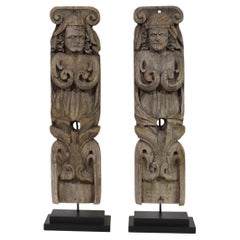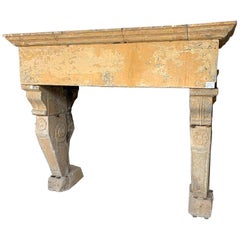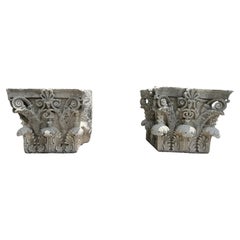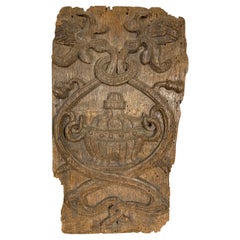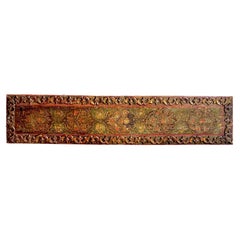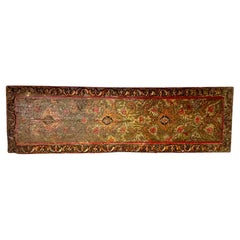Renaissance Architectural Elements
Spanning an era of cultural rebirth in Europe that harkened back to antiquity, the Renaissance was a time of change in design. From the late 1400s to the early 1600s, Rome, Venice and Florence emerged as artistic centers through the expansion of global trade and a humanist belief in the arts being central to society. Antique Renaissance furniture was ornately carved from sturdy woods like walnut, its details standing out against the tapestries and stained glass adorning the walls.
Renaissance chests, which were frequently commissioned for marriages, were often decorated with gilding or painted elements. Those that were known as cassoni were crafted in shapes based on classical sarcophagi. As opposed to the medieval era, when furniture was pared down to the necessities, a wide range of Renaissance chairs, tables and cabinets were created for the home, and the designs regularly referenced ancient Rome.
Large torchères of the Renaissance era that were used as floor lamps were inspired by classical candelabras, while marble surfaces evoked frescoes. The inlaid boxes being imported from the Middle East informed the intarsia technique, which involved varying hues of wood in mosaic-like patterns, such as those by architect Giuliano da Maiano in the Florence Cathedral.
Tapestry-woven cushion covers accented the variety of Renaissance seating — from conversation to study chairs — while bookcases for secular use reflected the migration of culture and knowledge from the church into the home. The aesthetics of the Italian Renaissance later spread to France through the publishing of work by renowned designers, including Hugues Sambin and Jacques Androuet du Cerceau. Centuries later, the 19th-century Renaissance Revival would see a return to this influential style.
Find a collection of antique Renaissance case pieces, decorative objects and other furniture on 1stDibs.
17th Century French Antique Renaissance Architectural Elements
Oak
16th Century French Antique Renaissance Architectural Elements
Sandstone
16th Century Italian Antique Renaissance Architectural Elements
Limestone
17th Century European Antique Renaissance Architectural Elements
Wood
18th Century Italian Antique Renaissance Architectural Elements
Wood
18th Century Italian Antique Renaissance Architectural Elements
Wood
19th Century European Antique Renaissance Architectural Elements
Zinc
16th Century Italian Antique Renaissance Architectural Elements
Marble
16th Century Italian Antique Renaissance Architectural Elements
Stone
18th Century French Antique Renaissance Architectural Elements
Limestone
19th Century European Antique Renaissance Architectural Elements
Wrought Iron
21st Century and Contemporary Italian Renaissance Architectural Elements
Limestone
Late 17th Century Italian Antique Renaissance Architectural Elements
Walnut
16th Century French Antique Renaissance Architectural Elements
Stone, Limestone
Late 20th Century Italian Renaissance Architectural Elements
Stone
19th Century Italian Antique Renaissance Architectural Elements
Wood, Paint
19th Century Italian Antique Renaissance Architectural Elements
Iron
19th Century British Antique Renaissance Architectural Elements
Linen
19th Century Antique Renaissance Architectural Elements
Oak
Late 19th Century Italian Antique Renaissance Architectural Elements
Walnut
19th Century Italian Antique Renaissance Architectural Elements
Limestone
19th Century Italian Antique Renaissance Architectural Elements
Stone
17th Century French Antique Renaissance Architectural Elements
Iron
Early 19th Century Italian Antique Renaissance Architectural Elements
Stone
21st Century and Contemporary Italian Renaissance Architectural Elements
Stone
17th Century English Antique Renaissance Architectural Elements
Oak
19th Century Italian Antique Renaissance Architectural Elements
Marble
Mid-20th Century English Renaissance Architectural Elements
Brass
19th Century Italian Antique Renaissance Architectural Elements
Iron
18th Century and Earlier Dutch Antique Renaissance Architectural Elements
Brass, Iron
16th Century European Antique Renaissance Architectural Elements
Pine
Late 19th Century American Antique Renaissance Architectural Elements
Cement
19th Century French Antique Renaissance Architectural Elements
Stone
16th Century French Antique Renaissance Architectural Elements
Iron
17th Century Italian Antique Renaissance Architectural Elements
Limestone
